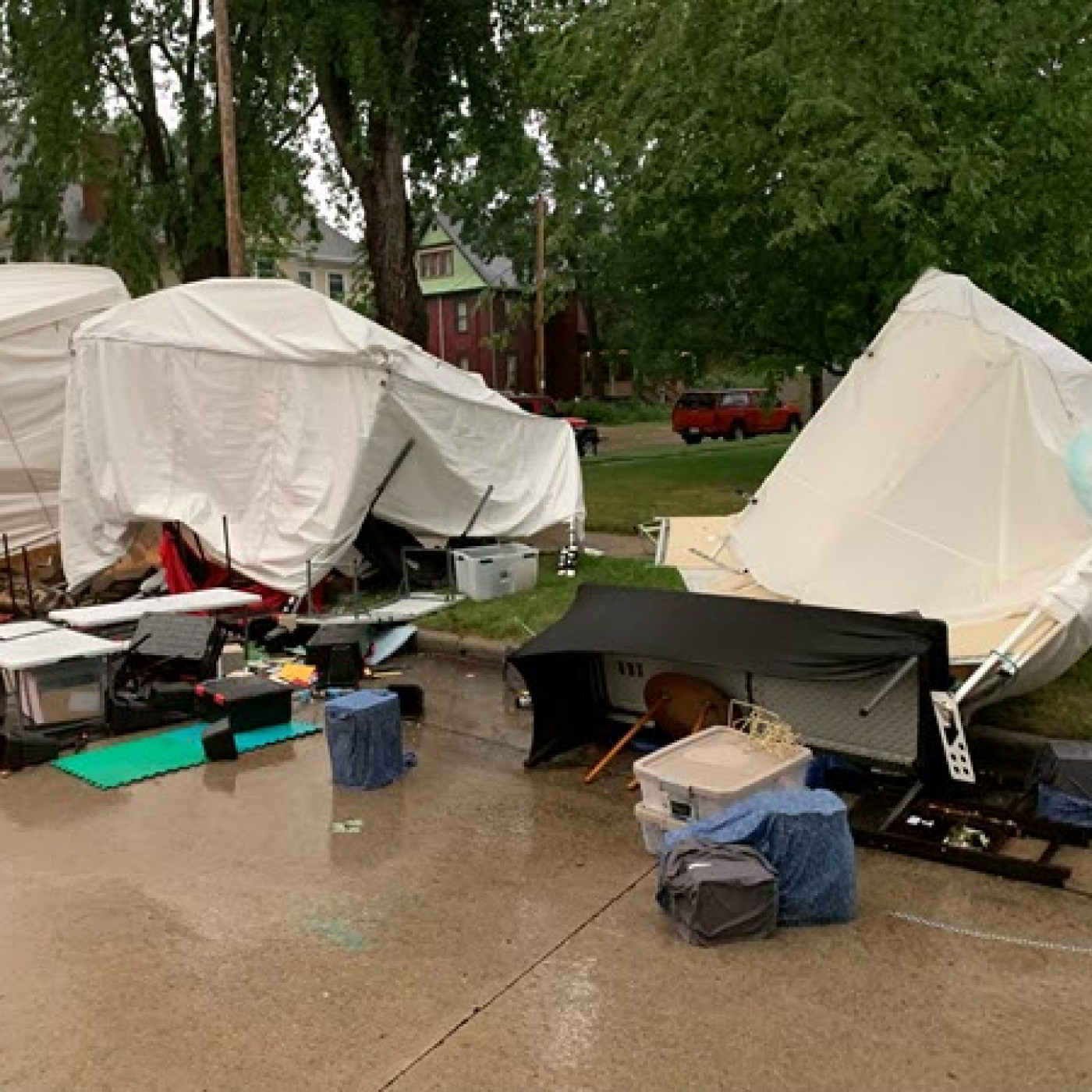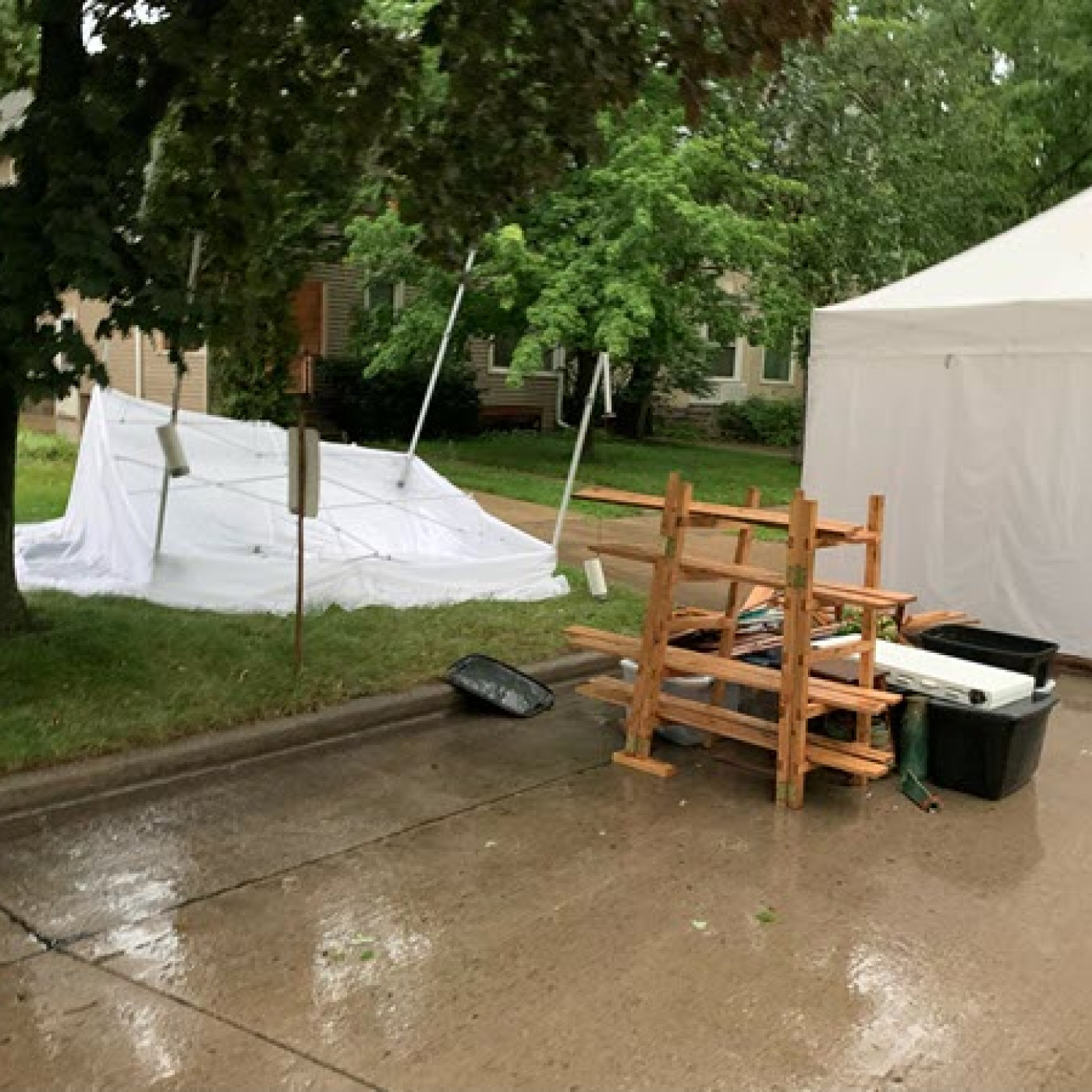Life on the Road Blog: Stormy Weather


Photos courtesy of Scott Obernberger
Tips for Protecting Your Work
Summer show season is wrapping up as I write this month’s installment, and the last two shows I participated in experienced significant weather drama.
The first had straight-line winds of 60 to 70 mph hit at the end of day one. More than 30 tents were, to put it mildly, wiped out along with most of the work of the respective artists.
Many had not properly prepared, and as a result, their tents slammed into other tents, damaging and destroying not just their work but their neighbor’s as well. Sadly, this is a scene I’ve observed before.
A few years back, I was at a different show where a microburst wiped out the whole show. Very few of us were lucky enough to get through unscathed.
The second show I recently exhibited in had reports of impending thunderstorms. With many of the artists being new, they had either no weights or nominal weights. Thankfully, the storms broke up and hit elsewhere, but things could have gotten very ugly.
The only feeling worse than seeing months of your hard work destroyed is trying to understand why you lost everything after taking the necessary precautions to secure it, all because someone else chose not to weight their tent properly or take their obligations seriously. You have not only lost your work — you have lost your inventory. You’ve now lost sales from this show and the many shows yet to come.
Umbrella
I know we touched on “duty” before, but recent events make it worth repeating. It is easy to think of things from the angle of what is best for us. That is a natural instinct.
All living creatures have a default position of survival and self-interest, and when we slide into that method of thinking, we downplay — or even forget about — our neighbor’s needs. I realize it may seem like a bit of a leap to put things this starkly, but all our decisions ultimately impact not just us but also all the people around us. Sometimes they even impact people we will never even meet.
Back when I practiced law and was preparing clients for sentencing, we often talked about how actions affect others. We talked about what happens when you see a still pond — quiet, peaceful, no movement of the water — and then throw a rock into it.
Yes, the splash is most directly felt where the rock breaks the surface. But then there are the waves. The water nearest the impact is affected significantly, but it doesn’t mean it stops there. It keeps going, even affecting the shoreline, albeit less obviously, as the ripples hit shore and move the grains of sand.
At first, we scoff at the effect on the shoreline. But then we see what happens over time as parts of the shoreline slip away. It is always harder to repair the effects we have on so many than it is to try preventing harm in the first place.
We need to keep in mind that many of us make our living doing this wonderful, difficult work. We depend on art shows and events being safe and secure so mortgages get paid, food is put on the table, and the business of life continues.
Taking steps to protect our work and space is not only for ourselves but also for our neighbors. Being a good neighbor means making an effort to prevent our things from hurting our neighbors’ things. We all have a duty to each other.
I’ll Be There for You
How do we protect our neighbors as well as ourselves? Here are some tips:
- Have a sturdy tent that is constructed for the purpose of art shows. It doesn’t have to be the most expensive tent, but it can’t be a $50 canopy meant to shade a picnic.
- Weight your tent. You need a minimum of 40 pounds per leg. I use 66 pounds per leg on the frame of my tent. A gallon jug of water on each leg is not anywhere close. Weights are probably your best defense.
- Stake your tent down whenever the area allows it. I use the corkscrew stakes and heavy-duty ratchet straps attached to the tent frame on each corner. This significantly enhances the weights on the tent.
Promoters have a duty to their artists as well:
- Have rules — require that tents be weighted down and that precautions for bad weather be taken.
- Enforce the rules. Take the time to walk the show and make sure all artists are complying with the safety rules you set. Some shows I exhibit at have the fire marshal do this for them. If the artist doesn’t “pass inspection” and can’t cure the defect, they must leave.
- Stay on top of the weather. If dangerous weather appears imminent, give artists as much notice as practical so they can prepare.
- Don’t be afraid to call the show if dangerous winds are coming.
All of us need to work together to provide the most positive — and safest — experience for each other and our customers. I hope everyone is having a successful and safe season, and I look forward to next month!
